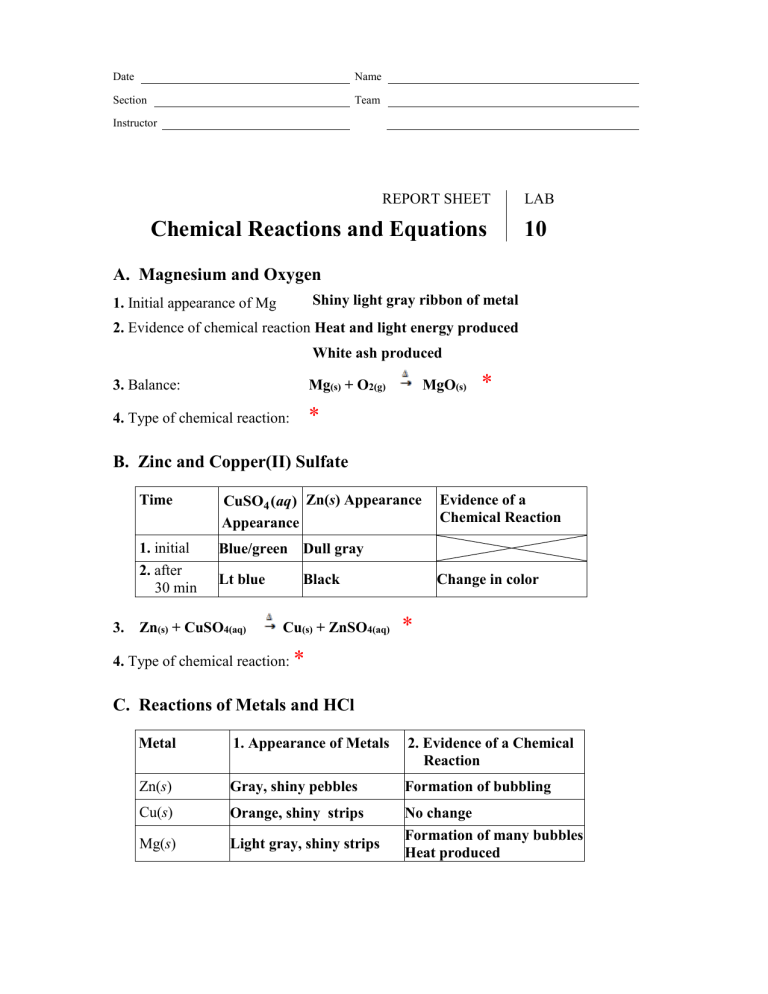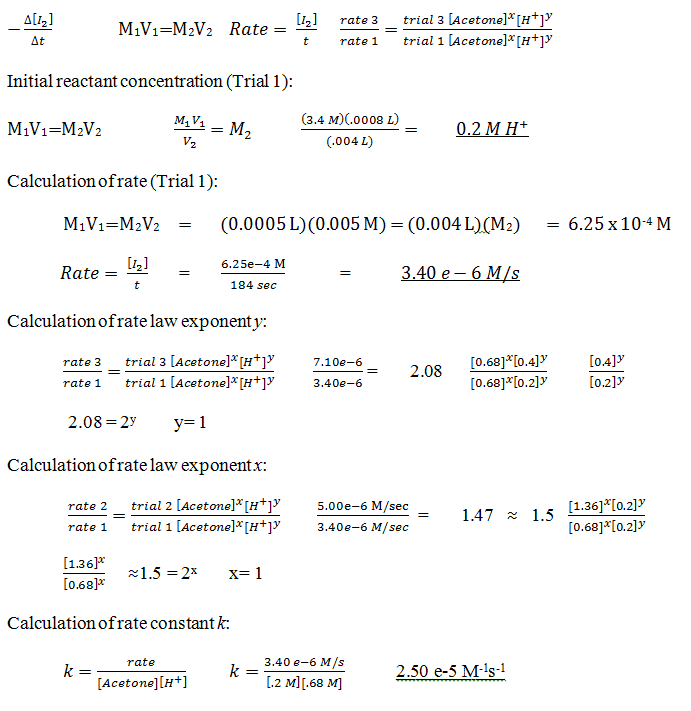Chemical Reactions And Equations Lab Report Sheet - The difference between both combination reaction and decomposition reaction is how their chemical equation is set up. In this series of experiments, you will first observe examples of various types of chemical reactions. Remember, each double replacement reaction should have formed either a precipitate, water, or a gas. Next you will write chemical equations that support your observations. For combination, the reactants are more than one,. Lab report on chemical reactions: Mg, zn, cu, hcl, ionic compounds, na2co3, h2o2. State what type of products were produced in each chemical reaction.
The difference between both combination reaction and decomposition reaction is how their chemical equation is set up. In this series of experiments, you will first observe examples of various types of chemical reactions. For combination, the reactants are more than one,. Lab report on chemical reactions: Next you will write chemical equations that support your observations. State what type of products were produced in each chemical reaction. Remember, each double replacement reaction should have formed either a precipitate, water, or a gas. Mg, zn, cu, hcl, ionic compounds, na2co3, h2o2.
Next you will write chemical equations that support your observations. Lab report on chemical reactions: Remember, each double replacement reaction should have formed either a precipitate, water, or a gas. In this series of experiments, you will first observe examples of various types of chemical reactions. For combination, the reactants are more than one,. State what type of products were produced in each chemical reaction. Mg, zn, cu, hcl, ionic compounds, na2co3, h2o2. The difference between both combination reaction and decomposition reaction is how their chemical equation is set up.
Chemical Reactions And Equations Lab 10 Answers Tessshebaylo
Mg, zn, cu, hcl, ionic compounds, na2co3, h2o2. Lab report on chemical reactions: For combination, the reactants are more than one,. State what type of products were produced in each chemical reaction. Remember, each double replacement reaction should have formed either a precipitate, water, or a gas.
Solved Instructor REPORT SHEET LAB Chemical Reactions and
In this series of experiments, you will first observe examples of various types of chemical reactions. Next you will write chemical equations that support your observations. For combination, the reactants are more than one,. State what type of products were produced in each chemical reaction. Lab report on chemical reactions:
Chemical Reactions Lab Report
State what type of products were produced in each chemical reaction. The difference between both combination reaction and decomposition reaction is how their chemical equation is set up. Lab report on chemical reactions: Remember, each double replacement reaction should have formed either a precipitate, water, or a gas. In this series of experiments, you will first observe examples of various.
Solved Chemical Reactions and Equations Report SheetLab 11
Next you will write chemical equations that support your observations. For combination, the reactants are more than one,. The difference between both combination reaction and decomposition reaction is how their chemical equation is set up. Lab report on chemical reactions: Remember, each double replacement reaction should have formed either a precipitate, water, or a gas.
Report Sheet Lab 10 Chemical Reactions And Equations Answers Tessshebaylo
Lab report on chemical reactions: Mg, zn, cu, hcl, ionic compounds, na2co3, h2o2. Next you will write chemical equations that support your observations. State what type of products were produced in each chemical reaction. Remember, each double replacement reaction should have formed either a precipitate, water, or a gas.
Solved Lab 10Chemical reactions and EquationsLab Report
Lab report on chemical reactions: For combination, the reactants are more than one,. The difference between both combination reaction and decomposition reaction is how their chemical equation is set up. Mg, zn, cu, hcl, ionic compounds, na2co3, h2o2. Next you will write chemical equations that support your observations.
Report Sheet Lab 7 Chemical Reactions And Equations Tessshebaylo
Mg, zn, cu, hcl, ionic compounds, na2co3, h2o2. State what type of products were produced in each chemical reaction. Next you will write chemical equations that support your observations. Remember, each double replacement reaction should have formed either a precipitate, water, or a gas. For combination, the reactants are more than one,.
Chemical Reactions And Equations Lab Worksheet Tessshebaylo
Remember, each double replacement reaction should have formed either a precipitate, water, or a gas. The difference between both combination reaction and decomposition reaction is how their chemical equation is set up. Mg, zn, cu, hcl, ionic compounds, na2co3, h2o2. Next you will write chemical equations that support your observations. For combination, the reactants are more than one,.
Virtual Lab Types Of Chemical Reactions Answer Sheet
For combination, the reactants are more than one,. Next you will write chemical equations that support your observations. State what type of products were produced in each chemical reaction. Mg, zn, cu, hcl, ionic compounds, na2co3, h2o2. Lab report on chemical reactions:
Chemical Reactions And Equations Lab 10 Answers Tessshebaylo
Mg, zn, cu, hcl, ionic compounds, na2co3, h2o2. In this series of experiments, you will first observe examples of various types of chemical reactions. The difference between both combination reaction and decomposition reaction is how their chemical equation is set up. Next you will write chemical equations that support your observations. Lab report on chemical reactions:
Mg, Zn, Cu, Hcl, Ionic Compounds, Na2Co3, H2O2.
The difference between both combination reaction and decomposition reaction is how their chemical equation is set up. In this series of experiments, you will first observe examples of various types of chemical reactions. Lab report on chemical reactions: Next you will write chemical equations that support your observations.
Remember, Each Double Replacement Reaction Should Have Formed Either A Precipitate, Water, Or A Gas.
For combination, the reactants are more than one,. State what type of products were produced in each chemical reaction.







